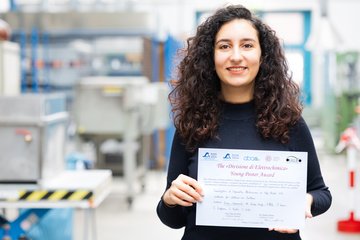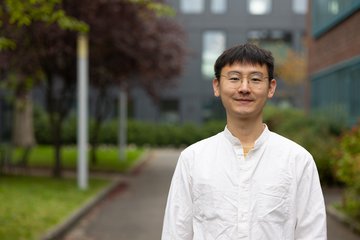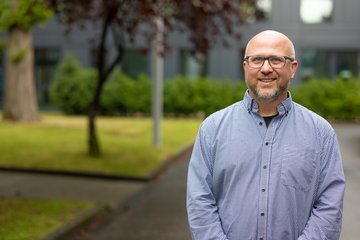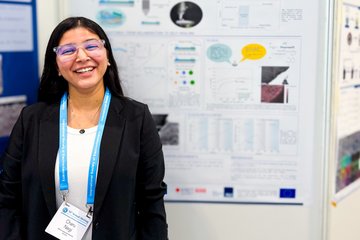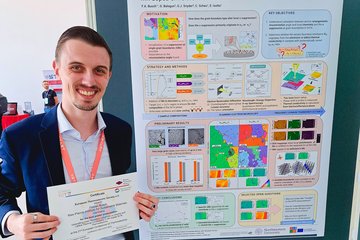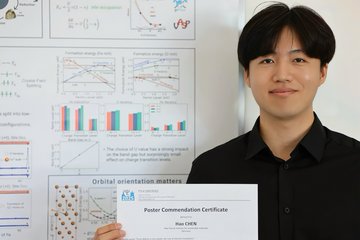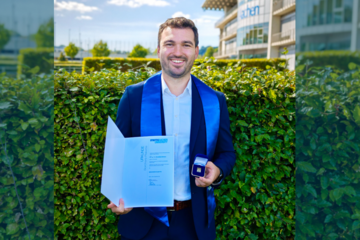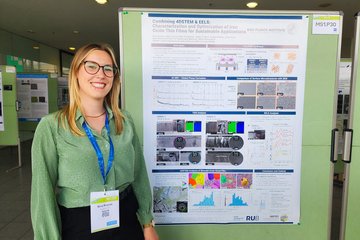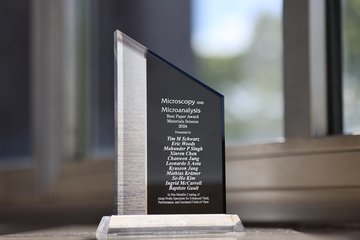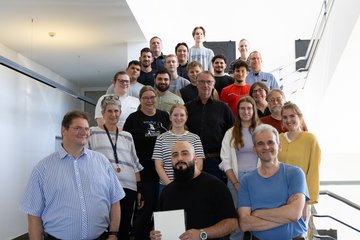All genres
61.
Journal Article
Importance and Challenges of Electrochemical in Situ Liquid Cell Electron Microscopy for Energy Conversion Research. Accounts of Chemical Research 49 (9), pp. 2015 - 2022 (2016)
62.
Journal Article
Oxygen evolution activity and stability of iridium in acidic media. Part 2. – Electrochemically Grown Hydrous Iridium Oxide. Journal of Electroanalytical Chemistry 774, pp. 102 - 110 (2016)
63.
Journal Article
Activity and stability of electrochemically and thermally treated iridium for the oxygen evolution reaction. Journal of the Electrochemical Society 163 (11), pp. F3132 - F3138 (2016)
64.
Journal Article
Oxygen evolution activity and stability of iridium in acidic media. Part 1. – Metallic iridium. Journal of Electroanalytical Chemistry 773, pp. 69 - 78 (2016)
65.
Journal Article
On the origin of the improved ruthenium stability in RuO2 - IrO2 mixed oxides. Journal of the Electrochemical Society 163 (11), pp. F3099 - F3104 (2016)
66.
Journal Article
Minimizing Operando Demetallation of Fe–N–C Electrocatalysts in Acidic Medium. ACS Catalysis 6 (5), pp. 3136 - 3146 (2016)
67.
Journal Article
Electrocatalysis for sustainable energy conversion or electrocatalysis today Preface. Catalysis Today 262, p. 1 (2016)
68.
Journal Article
Oxygen and hydrogen evolution reactions on Ru, RuO2, Ir, and IrO2 thin film electrodes in acidic and alkaline electrolytes: A comparative study on activity and stability. Catalysis Today 262, pp. 170 - 180 (2016)
69.
Journal Article
Tuning selectivity of electrochemical reactions by atomically dispersed platinum catalyst. Nature Communications 7, 10922 (2016)
70.
Journal Article
Positive Effect of Surface Doping with Au on the Stability of Pt-Based Electrocatalysts. ACS Catalysis 6 (3), pp. 1630 - 1634 (2016)
71.
Journal Article
Pt Sub-Monolayer on Au: System Stability and Insights into Platinum Electrochemical Dissolution. Journal of the Electrochemical Society 163 (3), pp. H228 - H233 (2016)
72.
Journal Article
Platinum recycling going green via induced surface potential alteration enabling fast and efficient dissolution. Nature Communications 7, 13164 (2016)
73.
Journal Article
The Stability Challenge on the Pathway to Low and Ultra-Low Platinum Loading for Oxygen Reduction in Fuel Cells. ChemElectroChem 3 (1), pp. 51 - 54 (2016)
74.
Journal Article
On the need of improved Accelerated Degradation Protocols (ADPs): Examination of platinum dissolution and carbon corrosion in half-cell tests. Journal of the Electrochemical Society 163 (14), pp. F1510 - F1514 (2016)
75.
Journal Article
Molecular Insight in Structure and Activity of Highly Efficient, Low-Ir Ir-Ni Oxide Catalysts for Electrochemical Water Splitting (OER). Journal of the American Chemical Society 137 (40), pp. 13031 - 13040 (2015)
76.
Journal Article
Dissolution of Platinum in Presence of Chloride Traces. Electrochimica Acta 179, pp. 24 - 31 (2015)
77.
Journal Article
Stability of Fe–N–C Catalysts in Acidic Medium Studied by Operando Spectroscopy. Angewandte Chemie, International Edition 54 (43), pp. 12753 - 12757 (2015)
78.
Journal Article
Electrochemical characterization of direct electron uptake in electrical microbially influenced corrosion of iron by the lithoautotrophic SRB Desulfopila corrodens strain IS4. Electrochimica Acta 167, pp. 321 - 329 (2015)
79.
Journal Article
General Method for the Synthesis of Hollow Mesoporous Carbon Spheres with Tunable Textural Properties. ACS Applied Materials and Interfaces 7 (13), pp. 12914 - 12922 (2015)
80.
Journal Article
The Effect of the Voltage Scan Rate on the Determination of the Oxygen Reduction Activity of Pt/C Fuel Cell Catalyst. Electrocatalysis 6 (3), pp. 237 - 241 (2015)
